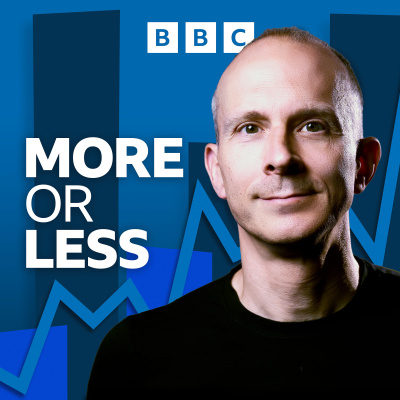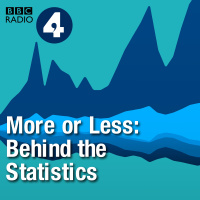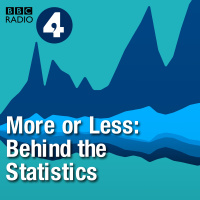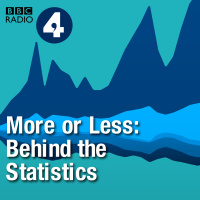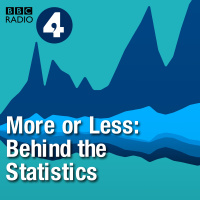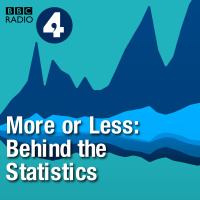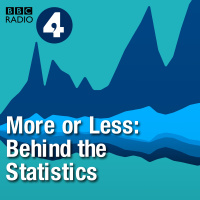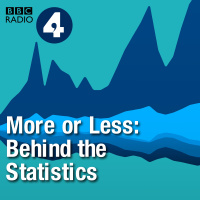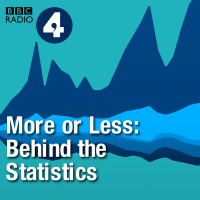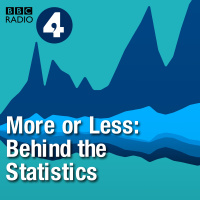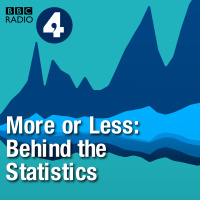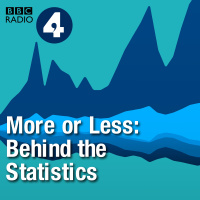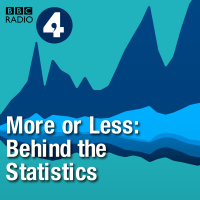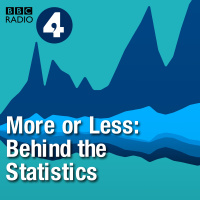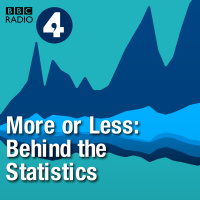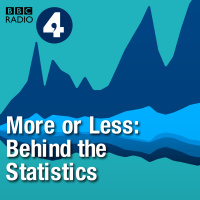Sinopsis
Tim Harford and the More or Less team try to make sense of the statistics which surround us. From BBC Radio 4
Episodios
-
Will the population of Nigeria be larger than Europe’s?
02/01/2022 Duración: 08minIn recent years population growth has slowed rapidly. Experts believe that the global population will stabilise somewhere around 11 billion people. But just because global population is stabilising doesn’t mean each country is following the global trend. Some projections estimate that the population of Nigeria will increase rapidly to the point that there will be more people living in Nigeria than the whole of Europe combined. We look at the methods behind this claim.
-
Numbers of 2021
26/12/2021 Duración: 08minA guide to the most concerning, striking and downright extraordinary numbers of 2021. Tim Harford asks three More or Less interviewees about their most significant and memorable figure over the past year. From the excess death toll of Covid-19; to declining total fertility rates, and a spike in the concentration of carbon dioxide in the atmosphere, we showcase the numbers that tell us something about the year gone by. During this programme, we speak to Hannah Ritchie, head of research at Our World in Data and senior researcher at the University of Oxford; Marina Adshade, Economics Professor at the University of British Columbia; and Heleen De Coninck, professor at Eindhoven University of Technology, and a lead author on several reports by the Intergovernmental Panel on Climate Change.
-
The psychological economics of gift giving
19/12/2021 Duración: 08minChristmas, the most wonderful time of the year – if you have something to sell that is. Every year we waste hundreds of dollars on gifts that aren’t appreciated, but how can you ensure that the gifts you buy hit the mark every time? We speak to behavioural scientist Professor Francesca Gino to find out more then use our newfound knowledge to exam an old Christmas classic
-
Does catching covid give you more immunity than being vaccinated?
12/12/2021 Duración: 08minImmunity to Covid-19. We've all been hoping to develop it ever since the virus emerged two years ago. Since then, a race to vaccinate the world has begun in earnest, with many countries rolling out booster shots in response to the rise of the Omicron variant. Health officials and scientists agree that vaccines are the safest way to develop immunity to the disease. But when US Congresswoman Nancy Mace took to Fox News recently, citing a study showing a whooping 27 times better immunity from natural infection than vaccination, we thought we'd better investigate. How did this study arrive at this number, and is it a fair representation of its findings?
-
Does wearing a mask halve your chances of getting Covid-19?
05/12/2021 Duración: 08minMasks, you may not have worn them before 2020 but now we’re all at it. With the rise of the Omicron variant countries have scrambled to reintroduce public health policies, among them mask wearing. Health officials and scientists agree that masks help reduce the incidence of covid19 infections – but by how much is still debated. Several newspapers recently reported that masks could cut Covid-19 infections by 53%, we look at how they came to this number and whether we should be believe it. (Image: Leon Neal/Getty Images)
-
Simpson’s Paradox: How to make vaccinated death figures misleading
28/11/2021 Duración: 08minVaccines are the best way to stop deaths and serious cases related to covid19, this is an irrefutable fact. However, recent ONS data seems to show that vaccinated people had a higher all cause death rate than unvaccinated people. Why is this data misleading? Here’s a clue: it’s to do with a quirky statistical phenomenon called Simpsons Paradox. (Image: The Simpsons / TCFFC )
-
A TikTok tale
21/11/2021 Duración: 08minNowadays if you are an academic and who needs some participants for a study you go online, but over the summer academic studies were inundated with participants who all happened to be teenage girls ... we explore how one TikTok can tip the balance of data gathering. Presenter: Tim Harford Producer: Chris Flynn(Image: TikTok logo is displayed on a smartphone screen/Getty/NurPhoto/contributor)
-
The carbon cost of breakfast at COP26
14/11/2021 Duración: 08minA French minister told people to eat fewer croissants at this year’s COP26 summit, after the menu said the carbon cost of the pastry was higher than that of a bacon roll, even if it was made without butter. Tim Harford investigates whether this claim could be true, and how the effect of food on climate change can be measured.(Image: Continental breakfast with coffee and croissants: Getty/Cris Cantón)
-
Same data, opposite results. Can we trust research?
07/11/2021 Duración: 08minWhen Professor Martin Schweinsberg found that he was consistently reaching different conclusions to his peers, even with the same data, he wondered if he was incompetent. So he set up an experiment. What he found out emphasises the importance of the analyst, but calls into question the level of trust we can put into research.Features an excerpt from TED Talks(Image: Getty/erhui1979)
-
The art of counting
31/10/2021 Duración: 08minWho is counting, why are they counting, and what are they are counting? These three questions are important to ask when trying to understand numbers, according to Deborah Stone, author of Counting, How We Use Numbers to Decide What Matters. In this episode, she explains how different ways of totting up can have real-world consequences.(Image: Betta Blue Red Veiltail/Getty Images/zygotehasnobrain)
-
The numbers behind Squid Game
24/10/2021 Duración: 08minNetflix has announced that South Korean survival drama Squid Game is its most popular series ever. We scrutinise the statistics behind the claim, and look at the odds of surviving one of the show’s deadly contests.
-
The prize-winning economics of migration and the minimum wage
17/10/2021 Duración: 08minDo immigrants drive down wages, do minimum wage increases reduce job opportunities, and do people who did well in school earn more money? These are questions that the winners of the 2021 Nobel Memorial Prize in Economics looked to the world around them for answers to. David Card, Joshua Angrist, and Guido Imbens developed ways of interpreting what they saw that changed the way economists think about what they see. In this episode of More or Less, presenter-turned-guest Tim Harford explains how.(Image: Mariel boat lift, which brought over 100,000 Cubans into the United States: Photo by Tim Chapman/Miami Herald)
-
Bonus episode: the first ever More or Less
07/10/2021 Duración: 36minA chat with More or Less's founding producer and presenter plus the first episode in full. Tim talks to Michael Blastland and Sir Andrew Dilnot about how More or Less came into being (after several rejections), whether politicians and journalists are more numerate now, and where the name come from. Then, the very first episode of More or Less, originally broadcast on Radio 4 on 13 November 2001.
-
Twenty years of More or Less
06/10/2021 Duración: 27minA look back at our origins, plus the usual mix of numerical nous and statistical savvy.It’s two decades since More or Less first beamed arithmetic into the unsuspecting ears of Radio 4 listeners. We revisit the show’s genesis with the original presenter and producer.Why are there two different figures about our vaccination rate doing the rounds and how does the UK now compare internationally?Plus listener questions on how the colour of your front door affects your house price, TVs on standby mode, and more. And we try to respond to a meteor storm of complaints about our earlier item asserting that Star Trek’s Mr Spock is in fact highly illogical.
-
The Gender Pay Gap
03/10/2021 Duración: 08minTim Harford talks to Planet Money’s Stacey Vanek Smith about the gender pay gap in the US and the UK – and how Renaissance writer, Machiavelli might be an unlikely source of inspiration for women in the workplace.
-
Is it easy being green?
29/09/2021 Duración: 29minIs our electricity extra expensive and our insulation inadequate? And a tale of tumbling trees.Internet infographics suggest we’re paying way more for our energy than countries in the EU. Are they being interpreted correctly? And what part, if any, has Brexit had to play?Insulation Britain activists have been gluing themselves to motorway slip-roads to raise awareness about poor home insulation. Their website says we have the least energy efficient homes in Europe. What’s the evidence?Plus, what do the numbers tell us about migrants trying to cross the Channel in small boats? Are stereotypes about different generations backed up by the data? And is it or is it not true that the UK has lots of trees?
-
Covid trends, face mask use, and the universal credit cut
22/09/2021 Duración: 27minA coronavirus check-in, our daily mask use measured, and a minister's claim on the universal credit cut questioned.There was a time when the latest Covid statistics were headline news daily, but as the pandemic has stretched on into its second year and third wave people don't pay as much attention. But on More or Less we still keep an eye on them because that’s how we roll.A recent article estimated that 129 billion single-use face masks are used every day around the world. It sounds wrong, but how wrong is it? And how did it get so wrong?Making up the shortfall from the £20 weekly cut in the universal credit benefit means working an extra two hours a week - or an extra nine, depending on who you listen to. We run the numbers.Plus, has the number of periods women have in a lifetime increased fourfold? And how many holes does a drinking straw have?
-
How many holes are there in a drinking straw?
19/09/2021 Duración: 08minTim Harford talks to Jordan Ellenberg, professor of mathematics at the University of Wisconsin at Madison, about the pandemic, geometry and drinking straws.(multi-coloured straws/Getty images)
-
Death, Tax and Dishwashers
15/09/2021 Duración: 27minNew data appears to show that double vaxxed people between 40 and 79 are getting Covid at higher rates than people who are unvaccinated, but that's not the case. It's all down to how Public Health England estimates the size of different populations. The Office for National Statistics described 2020 as "the deadliest year in a century". Now that we're more than two-thirds into 2021, we examine how this year is shaping up. We answer your questions on the new health and social care levy, and have words of congratulations and caution following Emma Raducanu's astonishing win in the US Open. Plus, where do you stand on in the dishwasher vs kitchen sink debate? GUESTS: Mathematician James Ward Adele Groyer of the Covid-19 Actuaries Response Group Helen Miller of the Institute for Fiscal Studies.
-
Vaccine waning, hot dogs and Afghanistan
08/09/2021 Duración: 27minShould we be worried that the protection against Covid-19 provided by the vaccines is going down? Could it really be the case that eating a hot dog takes 36 minutes from your life? The Bank of England holds 35% of Government debt. Who owns the other 65%? Has the UK spent more on Test and Trace than on its operations in Afghanistan?
